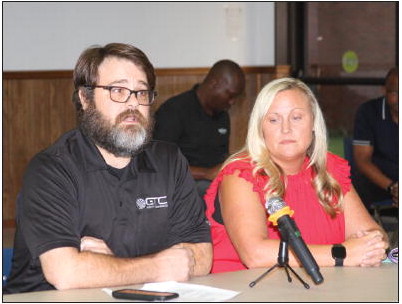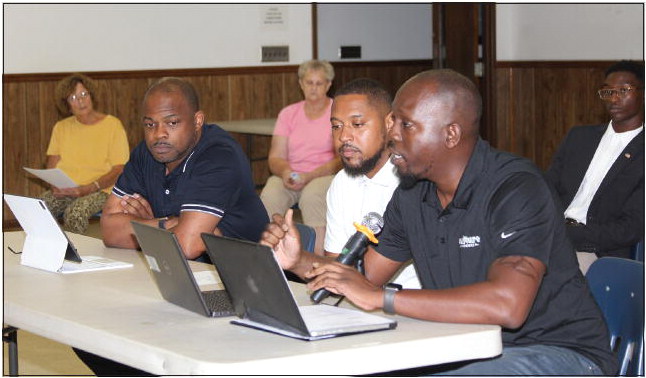Broadband Providers Seek Endorsement


Two broadband providers approached the Alamo City Council at its September 19 session to seek endorsement of their proposals to furnish services in Wheeler County.
Culture Wireless, based in Atlanta, represented by Jerome Howard, Chief Operating Officer, was first to make its pitch to the City, followed by Wheelerbased Glenwood Telephone Company/South Georgia Broadband (GTC/SGB), represented by owner James T. ( Jim) O’Brien.
Broadband service in Wheeler County is sporadic, with several companies providing partial coverage of the mostly rural county. In 2021, the City of Alamo signed a contract for an upgrade in service with Windstream/ Kinetic, which provided enhanced broadband within its city limits. The Wheeler County Commission previously provided Windstream/Kinetic with a letter continued from page
of endorsement to apply for a grant for broadband expansion in the county. The company did not secure the grant.
In Glenwood, the Wheeler County’s other municipality, GTC/GBS has been providing broadband services for several years. Over time, the company has expanded its network to areas outside of the City of Glenwood. A third provider, Progressive Rural Telephone Co., based in Rentz and with an area-wide customer base of 8,000, provides limited service in Wheeler County.
Numerous electrical memberships across Georgia have taken advantage of opportunities to expand broadband through publicprivate partnerships that Governor Kemp helped cultivate through legislative efforts like the passage of Senate Bill 2. This bill empowered Electric Membership Corporations (EMCs) to provide broadband service, but, in Wheeler County, that has not been the case. Although Little Ocmulgee Electrical Membership is headquartered in Alamo and serves not only all of Wheeler County, but also portions of Telfair and Laurens counties, EMC administration has steered clear of offering broadband services.
One of the most critical areas of need for broadband services is students, teachers and staff whose homes are located throughout the rural county. Superintendent of Schools Suzanne Couey said while the school itself has state-of-the-art internet connectivity, at home and away from school many of the system’s students, teachers and staff are still dependent on “hot spot” connectivity rather than consistent, high-quality broadband.
Closing the Digital Divide
Both broadband companies that appeared before the Alamo City Council are vying for a portion of the $240 million grant to continue expansion of highspeed internet across Georgia that was announced by Governor Brian Kemp on August 12. These funds are being made available through the Capital Projects Fund Grant Program (CPF). CPF funding is being administered and deployed by the Office of Planning and Budget (OPB) through a competitive grant program that officially launched August 15. Applications for this funding are due by October 7, thus putting pressure on the Alamo City Council to act quickly on an endorsement.
The CPF program will provide the needed support to build comprehensive broadband networks in many communities struggling with the lack of broadband access. Approved projects will use leading technologies to offer reliable, high-speed internet access that will be able to support a household with multiple users, along with businesses and their 21st-Century operations.
The CPF program comes on the heels of the largest state investment in high-speed internet infrastructure in Georgia’s history. In February of 2022, Governor Kemp announced more than $400 million in grant awards to support broadband expansion. The awarded projects aim to serve approximately 180,000 locations, representing both homes and businesses, with faster and more reliable broadband.
By the end of 2022, the amount of public funds that will go to expanding broadband access during Governor Kemp's administration will approach $1 billion.
Culture Wireless
Culture Wireless’s CEO, Jerome Howard, told City Council members he and his team attended the meeting to inform them about what kind of service they could expect from his company through partnering with Wheeler County. He said the company, based in Atlanta, has a large client base in that area but is also familiar with South Georgia because it has been working with Coffee County. “We focus on underserved communities in both inner cities and rural areas.”
Al Adjahoe, Culture’s CEO, explained that the company model is “we believe everybody deserves access to high-speed internet. We try to look at the delivery of internet as a community function, just like power, sewer, and phone service. Internet needs to operate in the same manner because it is so important.”
He stressed that the company works with wholesale and retail partners and through the federal Affordable Connectivity Program (ACP) that helps low-income residents access internet service. Culture could provide 100 megabytes of service, which the federal government had designated as the minimum service needed to sufficiently handle basic uses, which would be available for $5 monthly to customers who qualify for ACP. “Of course, we can provide a higher level of service,” he said. The company is equipped to provide the full range of services up to and over a gigabyte, depending on the plan selected by the customer.
“We use a combination of fiber and wireless to bring internet to customers on a case-by-case basis, but you need education behind that,” Adjahoe said. Culture, working with nonprofits and organizations, educates customers about how to use the internet. “Like seniors, who need access to telemedicine.” He emphasized that a rural area like Wheeler County, which is located 30 minutes or more from major health care facilities, can particularly benefit from internet service.
Additionally, the company offers community redevelopment training to local residents who have the potential to provide service and maintenance of the company’s local infrastructure. “This will promote new local business and enhance growth and development in the community,” he said.
Howard emphasized, “We want to assess what is here, what is needed, and find out what has not been touched, then agree on a plan with the City and County. It would be 100% free for the City and the County because we will provide the infrastructure, but what is required is a letter of endorsement so that we can apply for the funding.”
When asked by City Attorney Russell Clark what Culture could add to the services already provided to the City of Alamo through Windstream, Howard said his company is prepared to work with already-established providers to complete the goal of providing area-wide services. Adjahoe said, “We encourage everyone to work together to finish the goal. We have the opportunity to pull the pieces together.” Glenwood Telephone/ South Georgia Broadband Jim O’Brien, owner of Glenwood Telephone Company, informed City Council members that his company has already started extending fiber optic cable outside of Glenwood. “Through our fiber optic cable, we will be able to offer a gigabyte of service to our customers. Fiber is the technology that will be here for decades to come.” In 2019, GTC launched South Georgia Broadband to provide services outside its local exchange. The company has started projects in Montgomery and Wheeler counties, as well as in parts of Mount Vernon and Alamo.
O’Brien is the third generation of his family to operate GTC. “I know full well the promises that have been made in the past. We are ready to put boots on the ground and lay fiber. The Governor has put a lot of money on the table, and Wheeler County has a darn good shot at getting part of it. That is why I am here.”
O’Brien said he previously approached the City Council to request support of a broadband initiative, but both the City and County opted for Windstream/ Kinetic. “We feel like this is our best opportunity, not just for Glenwood Telephone, but for Wheeler County to solve the digital divide. For too long other providers have promised service, especially in rural in areas, and not delivered.”
Noting that over 90% of GTC’s customers have broadband, O’Brien said, “We believe this can be done. This grant is focused on the last mile customers. That is who you are going to get funding for in this last grant.” The last mile customers are those who have not been included in the broadband network that already exists.
O’Brien said he had already approached the Wheeler County Commission regarding his proposal and has gotten letters of support from all three County Commissioners, as well as from Sen. Blake Tillery, R-Vidalia, and Rep. Leesa Hagan, R-Lyons, whose areas of representation include Wheeler County. Wheeler County Sheriff Randy Rigdon, Wheeler County Superintendent of Schools Suzanne Couey, The Wheeler County Chamber of Commerce, and the City of Glenwood have also written letters of support. He assured the City Council that no funds are needed from it since GTC would provide any matching funds required for the broadband expansion. He did ask that the City consider a franchise agreement so that his company can build out, including providing service to the residents within the City of Alamo (Railroad Street to Slaton Street area) that have not yet been served through Windstream.
O’Brien’s company is now in the process of laying fiber optic lines on Hope Church Road in the southern part of Wheeler County going toward Spring Hill community, and along Snow Hill Community Church Road going toward Doubletree Road and looping back to Georgia Highway 126 in the northern section of the County.
GTC has links to other carriers, including Progressive, ATT and Windstream to provide service. O’Brien’s company, which has office sites in Glenwood and Alamo, also offers affordable service options through government programs. O’Brien said he has provided community broadband education in the past and is willing to do so again through local resources.
As the smallest independent telephone company in the state, GTC has been serving customers in Wheeler County for 80 years. It now serves 1,000 access lines and has 100 customers on broadband. “As a local provider, we can get to customers quickly.” O’Brien told the City Council that as a local exchange carrier, his company has been stuck in a box, putting in lines where they were requested by customers.
“I feel like we can get out of the box and provide the same quality service we have been providing for 80 years, but I know for a fact that if GTC does not grow, it will die. We need more customers to survive. I really believe this is the last piece of the puzzle in ensuring all of Wheeler County has fiber optic digital access.”

CULTURE REPRESENTATIVES – Culture Wireless, based in Atlanta, represented by Jerome Howard, Chief Operating Officer, left, was first to make a pitch to the City of Alamo for broadband services in Wheeler County. Also representing Culture were William Sparks, CMO, and Al Aladjahoe, CEO.Photo by Deborah Clark





